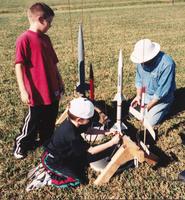 Fast Company article about how networks of amateurs more and more are replacing the pros. An increasing number of innovations are now being driven by such networks in fields like music, software, games, economics, astronomy. Fast Company article about how networks of amateurs more and more are replacing the pros. An increasing number of innovations are now being driven by such networks in fields like music, software, games, economics, astronomy.These far-flung developments have all been driven by Pro-Ams -- committed, networked amateurs working to professional standards. Pro-Am workers, their networks and movements, will help reshape society in the next two decades. ..
In the developing world, Pro-Ams are solving a historical scarcity of professional resources. The Grameen Bank, founded by Muhammad Yunus, a Bangladeshi economics professor, trains barefoot bankers to deliver loans to people earning less than a dollar a day. This Pro-Am workforce makes it possible to cost-effectively administer 2.8 million loans worth more than $4 billion. Had Grameen relied on professionals, it would have reached a tiny proportion of the population. ..
Astronomy used to be done in national "big science" research institutes. Now it is also done in global, Pro-Am, open-source collaboratives. There is still a huge gulf between amateur astronomers and theoretical astrophysicists. But the line between professional and Pro-Am astronomers has become fatally blurred. Much the same will happen in other fields.
Some professionals will find that unsettling; they will seek to defend their monopolies. The more enlightened will understand that the landscape is changing. Knowledge is widely distributed, not controlled in a few ivory towers. The most powerful organizations will enable professionals and amateurs to combine distributed know-how to solve complex problems.
Pro-Am activity will continue to expand. Longer healthy life spans will allow people in their forties and fifties to start taking up Pro-Am activities as second careers. Rising participation in education will give people skills to pursue those activities. New media and technology enable Pro-Ams to organize. Combining distributed know-how to solve complex problems. Yep, very cool. I dare say, that's where everything is headed. Flexible, distributed networks.
It is interesting that we could say that being a "professional" often means we have something invested in doing a certain job a certain way, whether we're really the best one for the job, whether it is really the best way or not. There's an inflexibility involved in being very educated in a certain field, being paid for doing it a particular way, and being part of a big slow-moving organization. Even if one is very qualified and organized, it might not for much longer provide any obvious advantage when competing with large numbers of people who have access to the same information, who are free to act on their passions with few constraints, and who possibly might become better organized than any hierarchical outfit can be.
[ Organization | 2004-10-06 23:59 | | PermaLink ] More >
|
 Fast Company article about how networks of amateurs more and more are replacing the pros. An increasing number of innovations are now being driven by such networks in fields like music, software, games, economics, astronomy.
Fast Company article about how networks of amateurs more and more are replacing the pros. An increasing number of innovations are now being driven by such networks in fields like music, software, games, economics, astronomy.